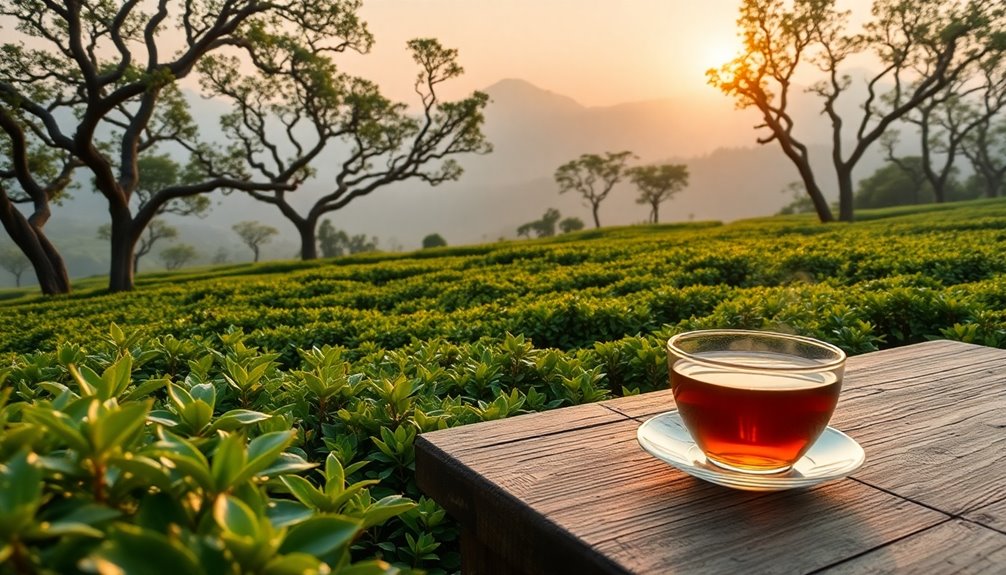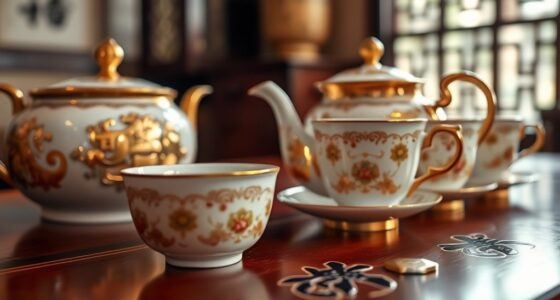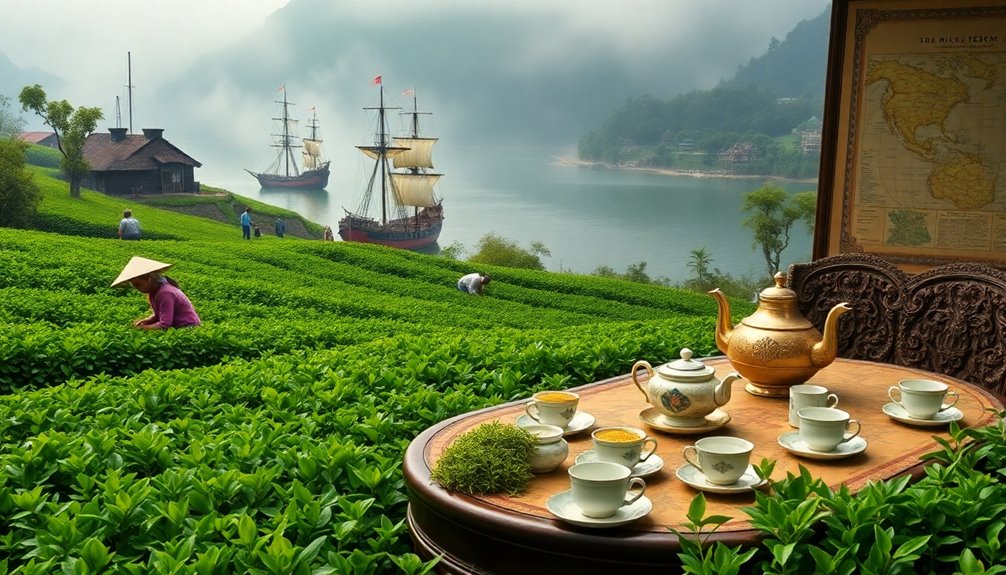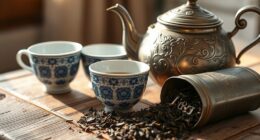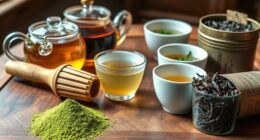Tea started its journey in ancient China, where beautiful ceremonies celebrated its cultural importance. As traders began importing it to Europe in the 17th century, tea quickly transformed from a luxury item to a staple in British society. This global phenomenon connects diverse cultures and practices, from Chinese hospitality rituals to Japanese mindfulness in Chanoyu. Over time, tea's role in trade grew, impacting economies around the world. Drinking tea can also promote health, thanks to its many benefits. Isn't it amazing how something so simple can have such a rich history? Discover more about tea's fascinating story!
Key Takeaways
- Tea originated in ancient China, evolving from a medicinal beverage to a cultural staple with deep-rooted traditions.
- The 17th century marked the start of European tea trade, transitioning it into a global commodity.
- British colonial expansion in the 19th century promoted tea cultivation in India, significantly shaping global tea markets.
- Tea ceremonies, like those in China and Japan, emphasize hospitality, mindfulness, and social connection across cultures.
- Today, tea is a multi-billion dollar industry, influencing economies and promoting wellness worldwide through its health benefits.
Introduction

Fast forward to the 17th century, and European traders began importing tea.
This delicious beverage transformed from a luxury item for the elite to a beloved staple in British society by the 18th century.
Today, tea has become a global phenomenon, enjoyed by millions as a comforting beverage in various cultures around the world!
Ancient Tea Rituals in China
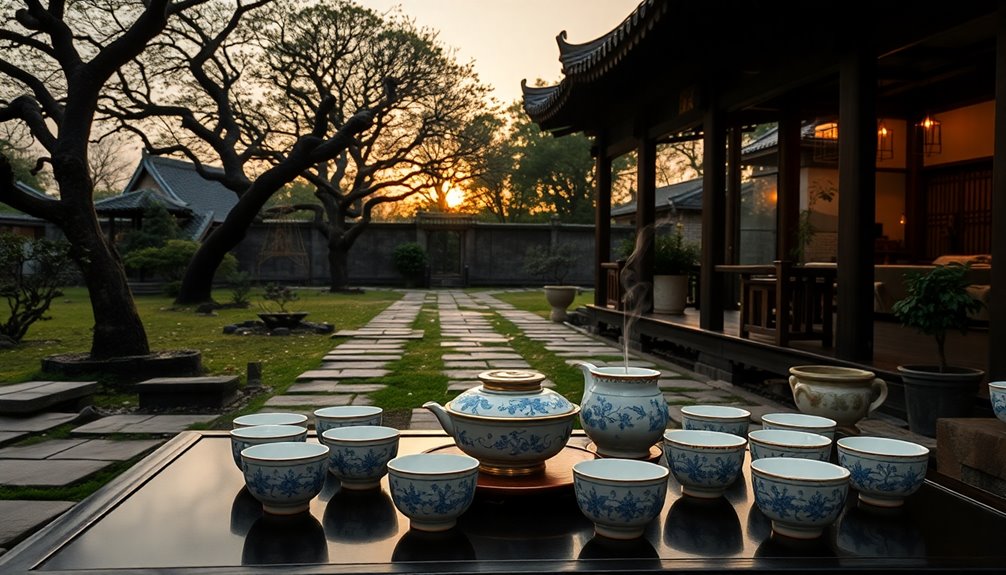
When you attend a tea ceremony, you'll notice specific utensils and precise techniques used in the preparation and consumption of tea.
These rituals reflect not just a drink but a way of connecting with others, highlighting the cultural significance of tea in Chinese hospitality.
Cultural Significance in Ceremonies
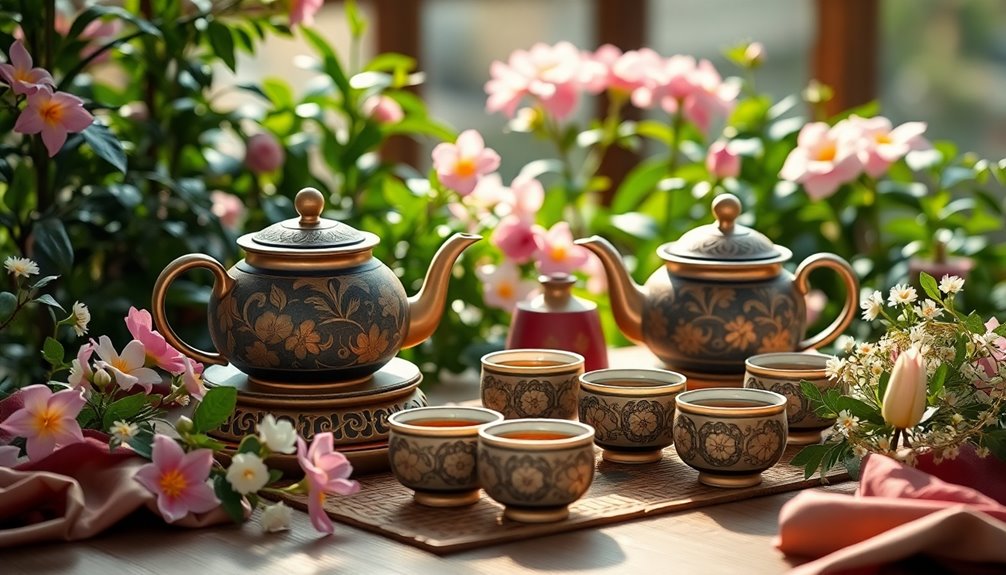
Tea ceremonies across cultures embody rich traditions and values, serving as a vital expression of social connection and respect. In China, during the Tang Dynasty, the tea ceremony became an essential part of social interactions, symbolizing friendship and hospitality. You can see this in the intricate rituals that bring people together, creating bonds over a shared cup of tea.
In Japan, the tea ceremony, or Chanoyu, emphasizes mindfulness and harmony. Here, participants prepare and serve matcha with great care, reflecting an appreciation for the moment.
Similarly, Korea's 다도 (Dado) focuses on tranquility and respect, fostering a peaceful atmosphere among guests.
Buddhist monks also play a role in these ceremonies, using tea to enhance focus during meditation. The calming effects of tea help deepen their spiritual practices.
Today, tea ceremonies vary around the world, each reflecting local customs and ingredients. Despite these differences, they all share core values of connection and appreciation for tea.
As you participate in these ceremonies, you'll discover how they nurture social interactions, promote hospitality, and invite mindfulness, enriching your understanding of this beloved beverage.
Tea's Role in Trade Networks

The rich traditions of tea ceremonies highlight not only the beverage's cultural significance but also its pivotal role in global trade networks. The tea trade began in ancient China and expanded during the Tang Dynasty, connecting regions through trade routes. By the 17th century, European demand for tea surged, leading to the British East India Company monopolizing the tea trade. They established direct links between China and Europe, making Chinese tea a highly sought-after global beverage.
In the mid-1600s, tea made its way to America, but things got heated when the British East India Company imposed taxes on tea. This led to the famous Boston Tea Party in 1773, where colonists protested against these unfair taxes.
Meanwhile, in the 19th century, the British East India Company pushed tea cultivation in India, turning Assam and Darjeeling tea into popular choices worldwide.
Today, tea is a multi-billion-dollar industry, with China, India, and Kenya leading production. The international trade of tea not only impacts economies but also influences cultural practices, making it a cherished part of life across the globe.
Colonial Exploitation of Tea Resources
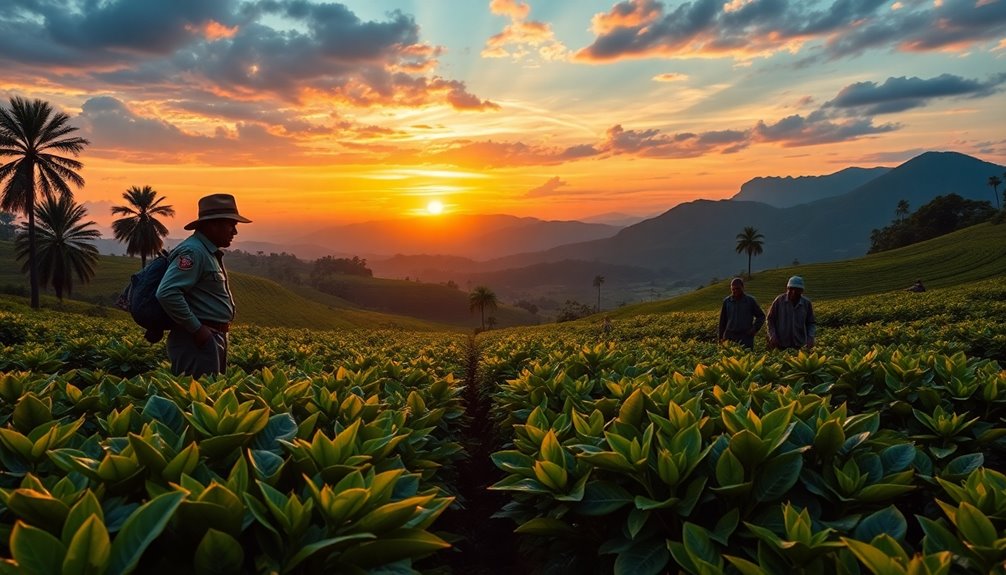
Additionally, the Opium Wars, driven partly by Britain's desire to control the tea market, caused political and social upheaval in China.
By the late 19th century, tea became a major global commodity, but the consequences of colonial practices left a lasting impact on both India and China.
Understanding this history helps you appreciate the complex journey of tea from ancient leaves to a beloved beverage enjoyed worldwide today.
Practical Applications
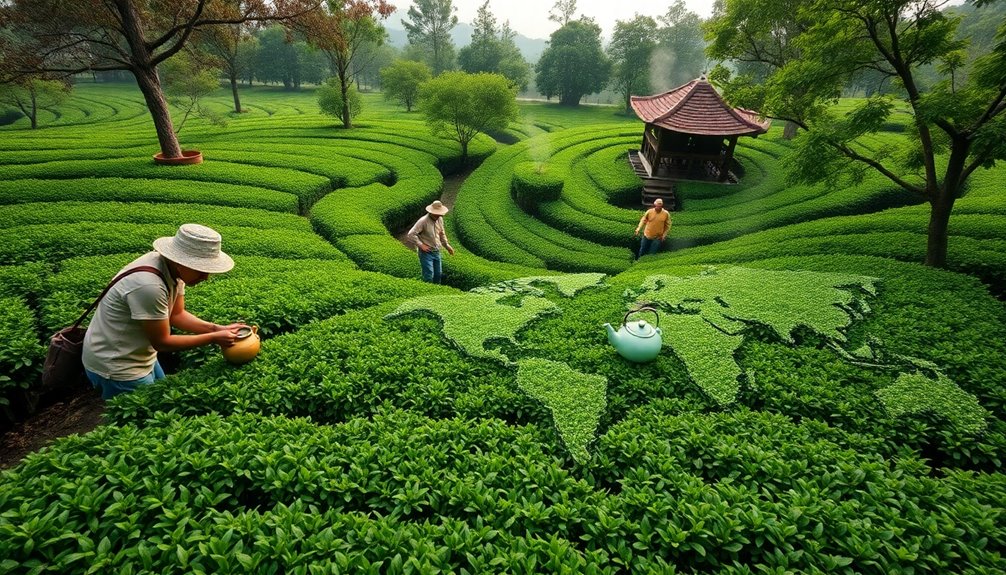
Colonial exploitation shaped the tea trade significantly, but today, tea serves various practical applications that extend beyond mere consumption.
You'll find that tea originated as a medicinal beverage, praised for its health benefits. Ancient texts praised its ability to aid digestion and boost mental clarity, and modern research supports these claims. Drinking tea is now a popular choice for health-conscious individuals, thanks to its high antioxidant content. Additionally, tea's high antioxidant content can contribute to overall wellness and may reduce the risk of chronic diseases. Furthermore, certain types of tea, like green tea, are known for their metabolism-boosting properties, while enjoying tea can also promote relaxation and reduce anxiety through the soothing ritual of brewing and sipping. Herbal teas, such as chamomile, are particularly celebrated for their calming effects and potential sleep benefits.
Moreover, tea plays a vital role in cultural practices worldwide. Unique ceremonies, like the Japanese Chanoyu, show how tea fosters mindfulness and community. You can even explore the distinct flavors that different regions offer, making each cup a new experience.
The global tea industry, especially in countries like India, significantly impacts economies. Millions depend on tea cultivation for their livelihoods. Interestingly, just as cacao ceremonies(https://example.com) promote emotional healing, tea ceremonies also encourage connection and reflection.
As you sip on your favorite brew, consider the economic impact it has on these communities.
Frequently Asked Questions
What Is the Story Behind the Origin of Tea?
You'll find tea's origin fascinating—legend says Emperor Shen Nong discovered it by accident in 2737 BCE. Initially valued for its health benefits, it evolved into a beloved social beverage over centuries, shaping cultures worldwide.
How Did Tea Originate and How Has It Become a Worldwide Demand?
You'll find that tea originated in ancient China for medicinal use, then gained popularity during the Tang Dynasty. Its introduction to Europe and subsequent cultural integration led to its global demand today.
What Weather Phenomenon Led to the First Discovery of Tea?
You'll find that a warm weather phenomenon, likely aiding in the growth of wild tea plants, led to the first discovery of tea when a leaf accidentally fell into Emperor Shen Nong's boiling pot of water.
What Is the Origin Point of Tea?
Tea's origin point traces back to ancient China, around 2737 BCE. You'd find Emperor Shen Nong discovering it when leaves accidentally fell into boiling water, transforming a simple mistake into a beloved beverage revered for centuries.
Conclusion
In conclusion, tea has a rich history that spans centuries and cultures. From ancient rituals in China to its role in trade and colonial times, tea is more than just a drink; it's a global celebration! So the next time you sip a warm cup, remember the journey those leaves took to reach you. Whether you enjoy it with friends at a party or during quiet moments, tea connects us all, making it a truly special experience.

